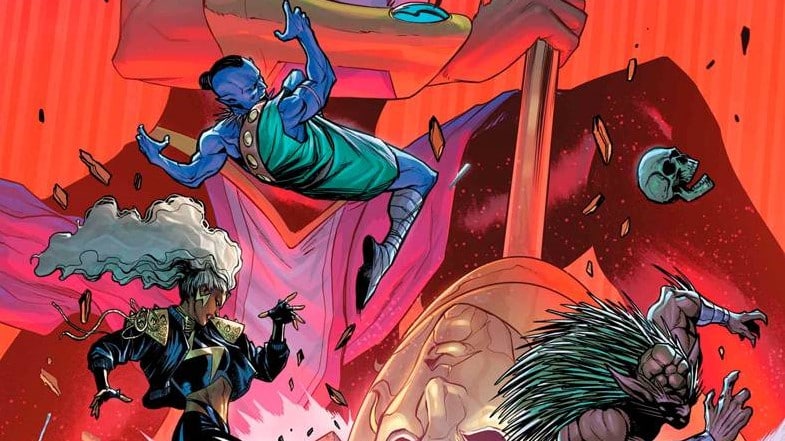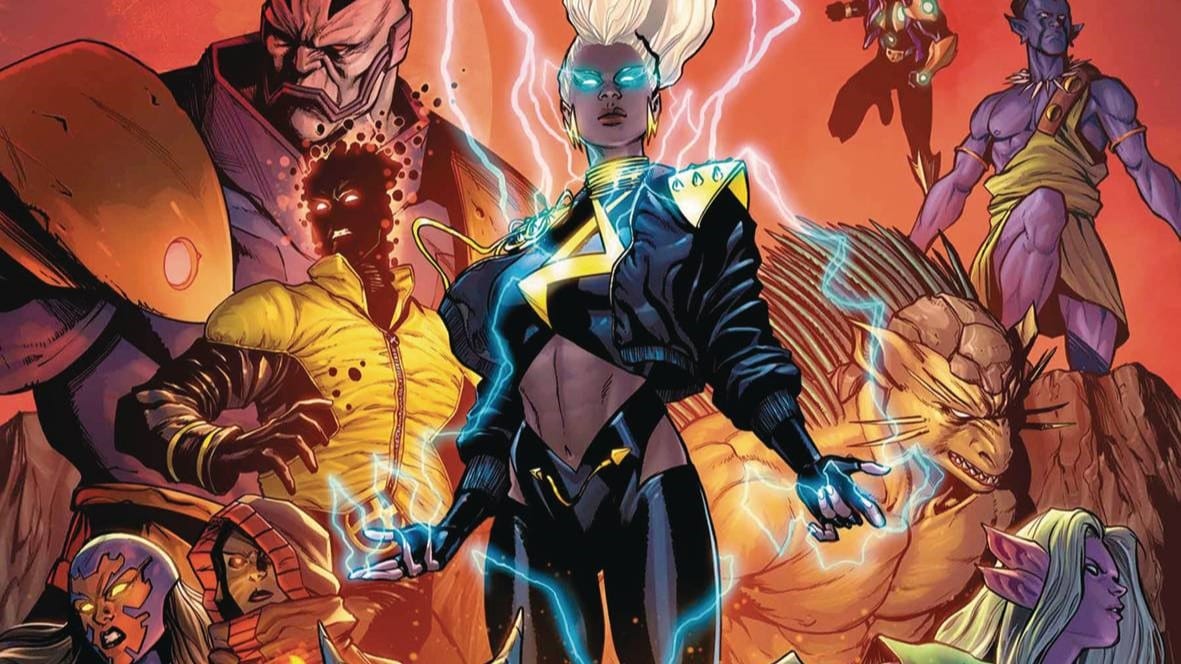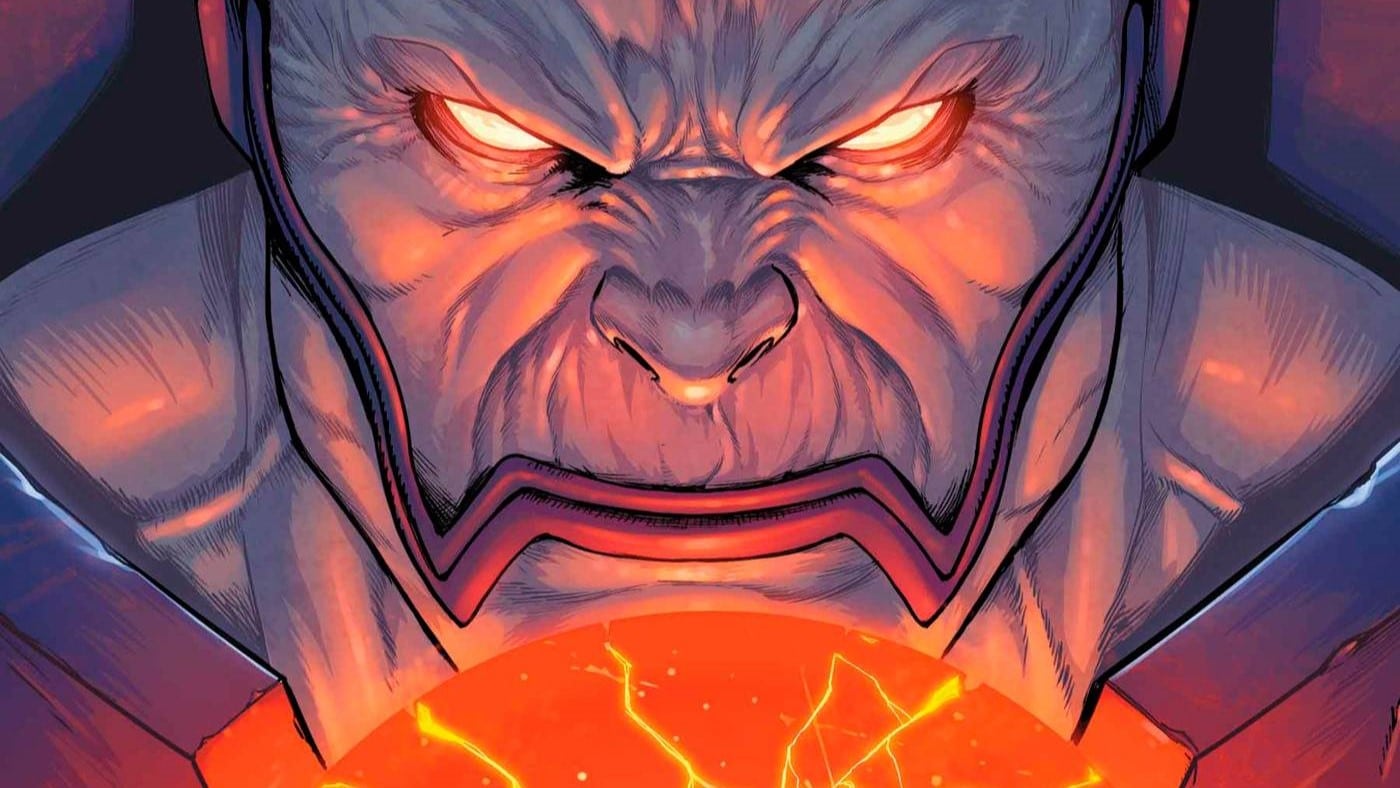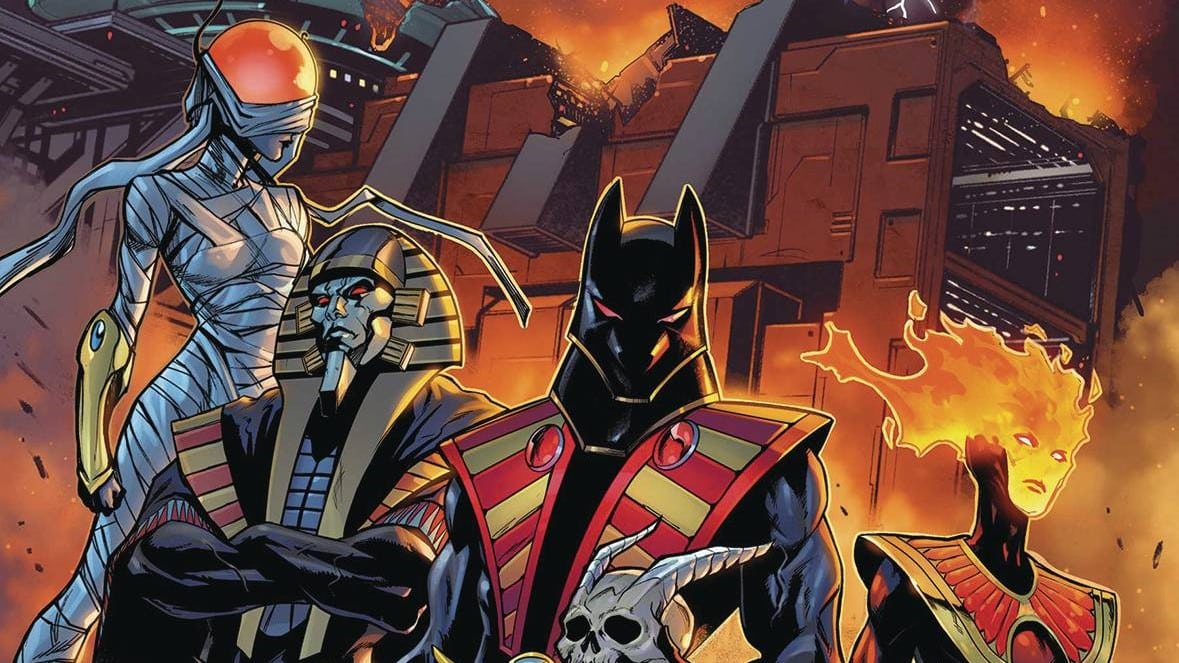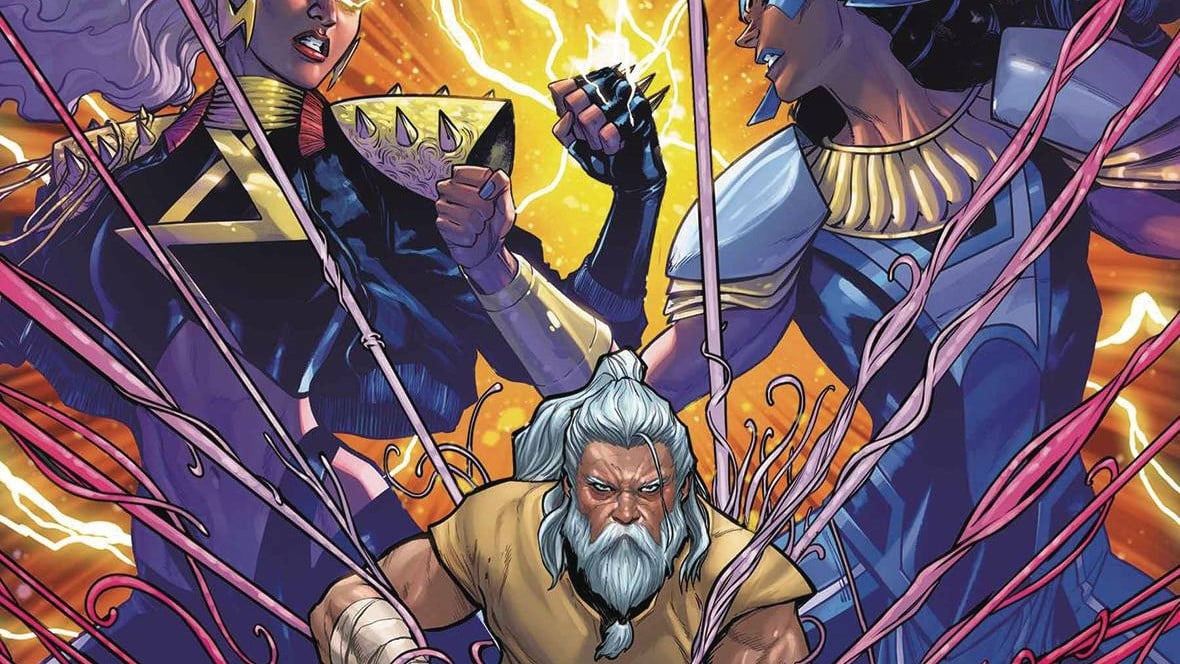Geneis and her fancy staff bring havoc to the Great Ring in X-Men Red #13 by Al Ewing, Jacopo Camagni, Federico Blee, and Ariana Maher.
“Your father has three dead friends.
All three of them used. Your father didn’t.
Your father, as I’m sure you’ve noticed, is alive.”
Thus concluded the one and only talk about drugs my mother ever gave to me.
There were no theatrics, nor follow up questions, nor any hint of rebellion on my end.
Nancy Regan never influenced me. All I got from DARE was a t-shirt. My mother’s words were all I needed.
Even after all of these years, after the (rightful) liberalization of policies that incarcerated generations of my elders and my peers — still, I do not partake.
Old fears die hard.
I’ve lived many lives over the years, and in each one of those lives I’ve known people who’ve been in the life. Addicted. Users. Abusers. Sellers and hustlers. I don’t judge anyone’s morals; and who would I be to tell someone how to cope with all of this?
Still, though virgin to the taste, though (so far) still immune to the allure, I’m well aware of the signs of addiction: the disassociation, disappointments…the delusion rightfully, sadly, associated with those who’ve fallen prey.
I see that in my community. I’ve seen it with friends. In my family.
And now, in X-Men Red #13, I see it again, loud as thunder, clear as the night sky, held in the hands of Genesis.
If the first arc of Red was focused on the benefits of community and communal cooperation vs. rugged individualism, this next arc looks to pit tradition against change; stagnation and comfort against growth. Genesis, understandably frustrated that her people have been repeatedly displaced and hurt, wants to come back to “save” her people, to bring them back to the place where they’ve been able to survive. This tension between toxic tradition and the awkward discomfort of growth is the central theme, sure, and writer Al Ewing handles the conflict with his usual aplomb.
And yet, when looking a little deeper — when pairing life experience with what I’ve read on page —I see another theme, another story: that of a drug and its holder over its dealer, of users and abusers.
And that of the people who, all too aware of the allure, do their best to resist.
This, admittedly, may not be the story Ewing’s set out to tell, but it’s the one that resonates with me.
And that I can receive something so resonant, so timely, so true, even unintentionally, is a testament to the continued excellence of this work.
Hope you don’t users are the only abusers…
“Genesis” is an irony, for she does not seek to start anything new. If anything, she is held prisoner by the ideologies of the old, unable to grow (unlike the vines she commands), trapped in a past of fighting and trauma that’ s come to define her and her people. In Heralds of the Apocolypse (the Fall of X one shot), we learn that she had the ability to end the war with Amenth on Okkara before it began, if only she were willing to ask for peace.
She refused.
Generations, millenia of bloodshed and war, all at her feet, because she, in her pride, was unable to concede the possibility of defeat.
She needed to win, to dominate.
Do own. To control.
I’ve known a few dealers in my day. Most of them long past their glory days, residing in anonymity, or incarceration, or incapacitated in a cemetery. All of them, however, every single one of them, for reasons ranging from noble to deeply arrogant, wanted — needed — to win at the game. To dominate their opponents.
To own. To control.
And where these young men (they were all young men) used pills and powders and pistols for control, Genesis used something more elegant and alluring.
The Staff of Annihilation.
But every time I felt that was that, it called me right back…
When Saturnyne transformed the helm of Annihilation into a staff during the end of X of Swords, she noted that a staff would be “a deeper lure.”
That lure, wielded and empowered by Genesis (but to be clear, not necessarily controlled by Genesis) has done an impressive amount of damage since the end of the Swords saga They’ve tamed the lands of Outerworld. They, along with Genesis’ children (minus, notably, Death), marched on the White Sword’s spire, taking control of his mind and, by proxy, the minds of the warriors at his command.
And now, they are here, on Arakko, ready to take more under their command.
Look how it operates: not with grandeur, not with bombast or soliloquy, but by quiet suggestion. One word or two, whispered gently in the ear. Upon first listen, there is a recognition that someone — something — is speaking. But when heard again, defenses fall under their enthrall.
The staff whispers “madman” and Ora Serrata loses all ability and desire to defend Jon Ironfire’s impassioned, informed speech.
The staff whispers “see it” and Ora and the newest member of the Arakki Circle, the dual headed war-wolf Lycaon, jump to defend Genesis and demean Ironfire.
The staff whispers “shame” and the ideal of help and community, ideals the water-wielder Sobunar once held as dear as the lakes in their blood, now flow out freely, his pride now lessened, his fight now gone.
The anger. The adherence, the pain. I’ve known addicts and additions, maybe less dramatic than Chris Rock’s infamous spiel, but no less demanding. No less sad.
The word of the staff is the drug, and half of the council are the users.
And yet, hope still springs eternal.
So if ya’ll hear my plight
And you think you can make it this far without a fight
Couple mistakes, here and there
Not always right, but i’m always real
That’s how I sleep at night
We’ve been led to believe Storm is the strong one, the perfect one: soul pure from the defilement of Sinister, mind impervious to the temptations of Xavier. And yet here, the helm says “miss” and she misses with a lightning bolt. The helm says “fight” and she, uncharacteristically, threatens Sobunar to a *death* dual.
Our queen is not our queen, even if she acknowledges that she needs to defy temptation. Even the strong among us are not immune.
My friend was an athlete and a scholar. He could jump and dunk though he was just barely six feet tall; he could run and twist though he never trained for sport. He was naturally smart and inquisitive. He was invincible.
Until he wasn’t.
I dare not tell his story in any detail here; his life is his life, and he and only he deserves to devolve into the details of his descent. Yet I will say that, from what I’ve heard, and seen — from our time talking then to now — that no one, not even those of us who walk on wind are immune.
Anyone can fall to temptation.
Notably, only three seem immune: Lactuca, who seems oddly detached from the actions below the stars; Lodus, the wordsmith poet who’s control of words (maybe?) empowers him against Annihilation’s silent tongue; and The Former Xilo, who we learn has been narrating this new history from the beginning, filling in the gaps that Uranos took.
Lactuca, then, boldly whisks Genesis’ opponents away to a location unknown, staying behind defiantly, daring Ora (and Genesis) to a challenge — a challenge subverted by Annihilation. They are called cowards for running away. They are called apostates for seeking refuge.
Genesis and her banner — her addiction, her master — now own the council.
And the war for the heart of Arakko has begun in earnest.
Analogies, of course, are imperfect. Everyone’s experience with the downfalls of addiction will vary. I make no attempt to speak for you, or for anyone else.
But I do speak for me and this work, this wondrous work, has spoken to me. X-Men Red continues to be the comic I’ve most enjoyed and connected with. Even if it doesn’t resonate with you the same way it did me, I’m willing to bet it will still resonate with you in a deeply personal way, if you let it.
Everything doesn’t need to be let into your heart. X-Men Red does.
X-traneous Thoughts
- Xilo (rather “That Which Was Xilo) at one point says “survival requires a fusion” which, in a literal sense, may mean their body needs support after losing so much and, in a metaphorical sense, since Xilo is history incarnate, may mean they need someone’s history — their knowledge and understanding — to fill in gaps for survival. Note Xilo says they have no name – I’m going to assume they fuse with the Fisher King, the survivor who famously had no name, in the next issue.
- The art here, as in previous issues, has highs and lows. I love the nuanced details on faces, particularly the distress in Sobunar and the joy in Genesis. Yet the colors feel muted, and as we have *several* mutants of color here (Storm, Genesis, Ironfire), a less muted palette would be appreciated. Also, Genesis’ features — particularly her nose and hair — seem to become wider or slimmer, with coils more prominent or looser, depending on the artist. I get it, I really do, but knowing how other X characters have been whitewashed (Sunspot, Manifold, Monet), I’m particularly aware of how she’s portrayed.
- The Seat of Dreams sitting empty while a realist attacks new traditions is certainly poignant, no?
- I kinda wish that / Lodus would speak in perfect / haiku, yet alas…
- I didn’t review Heralds of Apocalypse (sometimes we need a break), and the work deserves its own walkthrough. Still, one thing I do want to note: Apocalypse notes his new name — ::A:: — means “revelation.” The last book in the bible is the Book of Revelation, which, of course, matches the Alpha/Omega energy between him and Genesis. One should note, however, that for all his musings about how revelation is different than apocalypse — at how it’s not enough merely to witness — that the Book of Revelation is, in essence, a book about the end times. About — yep — The Apocalypse. The more things change, the more they stay the same.
- There is an argument — one that I’m sure others have made but I haven’t seen — that would compare what the Earth Mutants did to the Arakki to what European settlers did to the First Peoples. And while one analogy is enough for this particular work, it’s worth noting all of the unfortunate similarities between the plight of these people and other displaced, rejected, unaccepted peoples in the world.
A proud New Orleanian living in the District of Columbia, Jude Jones is a professional thinker, amateur photographer, burgeoning runner and lover of Black culture, love and life. Magneto and Cyclops (and Killmonger) were right.
Find more of Jude’s writing here.

